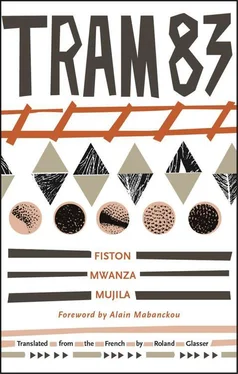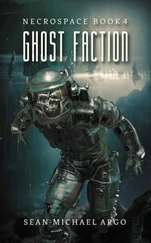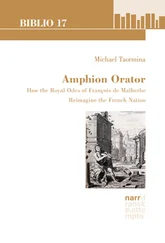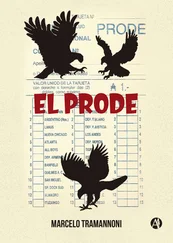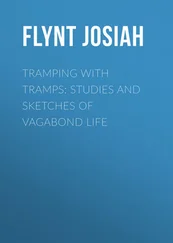He sighed.
“Do you have the time?”
A band from the Amazon, composed of Indians, readied themselves to go on stage. The interrogation continued. The man was surely someone influential. He wanted to know everything and was not to be offended. Who knows, perhaps his future Good Samaritan? Good intentions can be found even in the lion’s den. Each answer stirred his curiosity further.
“Married?”
“…”
“Divorced?”
“No.”
“What line of work are you in?”
He hesitated to go on.
“I hold a bachelor’s degree in history.”
The interlocutor slammed his glass down on the table and erupted into laughter. As if that weren’t enough, he got out of his chair, took a few steps, asked the musicians to lower their voices, and pointed his finger at Lucien:
“Dear friends, you’re not going to believe me: this man you see is a historian!”
General hilarity.
The whole Tram as one:
“Didn’t you give a shit, or what!”
Then as a scattered choir:
“And you earn a living doing history?”
“Look what can happen by dint of imitating the tourists!”
“You study girls too, or just history?”
“You’re an embarrassment to us, with your wallowing in art history!”
“I’ll throw myself onto the tracks if dad insists I study history and stuff,” exclaimed a kid, barely ten years old, who was with his father.
He returned to his table and half mouthed an apology at Lucien, who still didn’t understand what had just befallen him.
“I couldn’t help it. I just didn’t imagine there were any brainy people left in the City-State. This country’s been knocked flat, it’s all got to be rebuilt: roads, schools, hospitals, the station, even men. We need doctors, mechanics, carpenters, and garbage collectors, but certainly not dreamers!”
“Do you have the time?”
The music had resumed with even greater intensity. Lucien had lost the courage to give the man who had just humiliated him a withering look. He did, however, wish to get himself off the hook.
“You can’t do anything about a passion. But I’m not just a historian. I’m also a writer.”
A guy at a neighboring table butted in:
“Writer or historian, same difference.”
“I’m in writing, he insisted.”
“Writing. Writing. Writing.”
His interlocutor pronounced this word in a guttural voice. He remained circumspect, as if victim of an apparition. Lucien remained on his guard, for fear of being made a fool of a second time.
“I’m a writer but …”
“Young man, you are looking at Ferdinand Malingeau, director of Joy Train Publications.”
Lucien was speechless. He felt a kind of relief. The busgirls and the waitresses balked at bringing them their blasted beer, which, by the way, remained in the mixed facilities — RULE NUMBER 94: reality of life, when you drink, you piss, and when you piss, it remains your beer in your toilet. Lucien recalled Requiem’s “I prefer to piss at home.” He wanted to order a beer but not a single pair of eyes fell on him. It required the direct intervention of Joy Train Publications to resolve the situation. Finally, the first beer. The busgirl came over, vexed. Slammed the drink down. Stood back, bottle-opener in hand. Several seconds. Made up her mind, and opened the merchandise. A single verse:
“Tip!”
Lucien took out a bill.
“Here.”
She snatched the money and turned her back without a word. The traffic grew thicker. Our Indian friends, performing an anthem against global warming, child labor in the mines, deforestation, and the poaching of tilapia, pythons, piranhas, and white rhinoceroses, sowed panic among the common people. The women dissolved into tears. The men — tourists and other dropouts taken unawares by the sad saga of existence — shook their heads in repentance.
Lucien swiveled his head in the hope of glimpsing Requiem.
“How long you been in the writing game?”
“Do you have the time?”
“Ten years.”
“What or who do you write about? Got a target audience? Expectations? How many copies? Any literary prizes? What genre?”
He felt trapped. Questions shooting from all sides. He hadn’t even taken a sip!
“Anything you’re working on?”
He had to answer in the hope of getting published by Joy Train.
“Let’s just say a stage-tale that considers this country from a historical perspective. The Africa of Possibility: Lumumba, the Fall of an Angel, or the Pestle-Mortar Years . It is highly likely that this text will be performed in Europe. Characters include Che Guevara, Sékou Touré, Gandhi, Abraham Lincoln, Lumumba, Martin Luther King, Ceauşescu, not forgetting the dissident General.”
The publisher ordered a glass of rum and some ice cubes. Comings and goings to the restrooms: single-mamas, baby-chicks, students, office workers, tourists, musicians, Pentecostal preachers, jugglers, ex-convicts …
“I’m no communist. I don’t buy it. I know Lumumba is an emblematic figure of the independence of Congo-Zaire, but I feel that instead of Lumumba it’s best to depict our own heroes, such as a resistance fighter who paid the price for this city, instead of getting bogged down in the history of Congo-Zaire. And as for ‘The Congo for the Congolese,’ leave that part of history to the dramatists of this country! Here, as in the Back-Country, there are surely men who have left a mark on their era. Leave these great men to their dignified repose! Turn your mind to texts that talk of railroads, mines, or I don’t know what.”
“Let me explain …”
“Otherwise you restrict yourself to churning out an essay instead of blending genres.”
“I trained as a historian. I think, unless I am mistaken, that literature deserves pride of place in the shaping of history. It is by way of literature that I can reestablish the truth. I intend to piece together the memory of a country that exists only on paper. To fantasize about the City-State and the Back-Country with a view to exploring collective memory. Historical characters are my waymarks. But baby-chicks, diggers, famished students, tourists, and …”
“I’m familiar with that view of things. We’ve already had enough of squalor, poverty, syphilis, and violence in African literature. Look around us. There are beautiful girls, good-looking men, Brazza Beer, good music. Doesn’t all that inspire you? I’m concerned for the future of African literature in general. The main character in the African novel is always single, neurotic, perverse, depressive, childless, homeless, and overburdened with debt. Here, we live, we fuck, we’re happy. There needs to be fucking in African literature too!”
Lucien made the most of his interlocutor’s fervor to guzzle his first suds. As he raised his glass, he noticed the two girls from yesterday who were eyeing them up from afar. He attempted a friendly gesture, poor thing. The single-mamas took the gesture for a code, and came down to them without waiting to be asked twice.
“I’m interested in your stage-tale.”
The Amazonians left by the back door, having been begged by the busgirls, the diggers, the Pentecostal preachers, and the rest of the audience, who’d just wiped away their crocodile tears, to vacate the stage.
“You’re a handsome pair. Good evening, for starters.”
The two girls got settled. A rap group set to blazing up the joint. The rappers, a cantankerous and disreputable bunch of ex-students, ex-rebels, and ex-diggers, screamed, barked, moaned, haggled, and jabbered.
“I’m going to organize a rehearsed reading. Joy Train Publications is honored to present … what was the name of your stage-tale again?”
“ The Africa of Possibility: Lumumba, the Fall of an Angel, or the Pestle-Mortar Years. ”
Читать дальше
